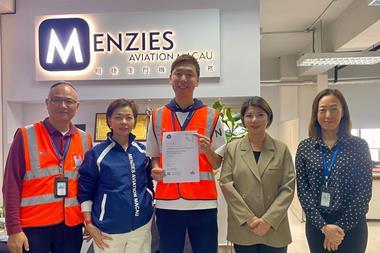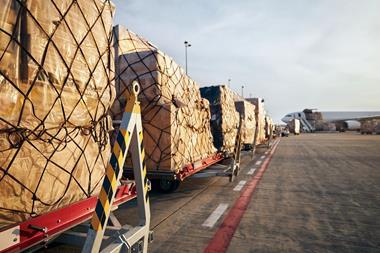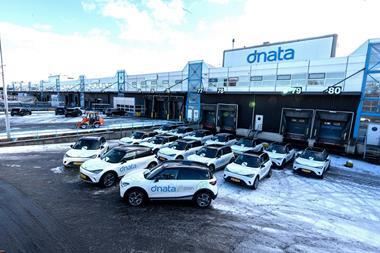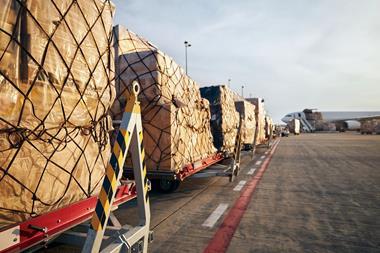Speaking at The 10th annual World Cargo Symposium (WCS) being held in Berlin this week (15-17 March), the director general and CEO of IATA, Tony Tyler, has called for further transformation in the airfreight sector, and pointed to greater quality of service as what he believes should be the priority for the industry.
As evidence of the need to reform, Association statistics reveal that the last few years have been difficult ones for the air cargo industry and that there are only limited signs of improvement in evidence today. Air cargo volumes grew by a mere 1.9% last year, the figures show, while yields have fallen every year since 2012. IATA predicts that volumes may rise by 3% this year but that competition from other modes (both land and sea) and from the integrators, coupled with the additional cargo capacity being made available in larger aircraft and airlines’ bigger passenger fleets, will all put further pressure on yields. As a result, the association expects yields to fall by a further 5.5% this year.
Tyler warns: “Air cargo continues to be a challenging environment for airlines to keep revenues ahead of costs. The business, however, generates enormous value. Let’s consider, in almost ten years that this WCS has been meeting, over 450 million tonnes of freight have been carried by air. And air cargo carries one-third of global trade by value, around $6 trillion worth each year. To do that profitably, the air cargo sector must bolster its key strengths of speed and flexibility with modern processes and improved quality. That means transformation.”
Premium service
Tyler continued: “Compared to other modes of shipping, air cargo is a premium service. Yet shippers give the industry a satisfaction rating of only 7 out of 10 on average. That is not good enough. The industry must raise the service quality of air cargo and provide a more personalised customer service.” The challenge, he said, is to increase service quality such that customers value the industry more and, with that in mind, IATA has dedicated resources to a new air cargo transformation programme. More information is to be given on this in due course but it is intended to “lead and shape” the industry’s response to the challenges it faces today.
In his speech, Tyler questioned why cargo has not undergone the same thorough transformation process that has seen a revolution in the passenger side of the aviation business. “Developments like e-tickets, barcoded boarding passes, airport self-check-in kiosks and inflight Wi-Fi have transformed the passenger experience,” he pointed out, asking, “Is it a coincidence that after a decade of change, load factors are at record highs and airlines are finally rewarding their investors with adequate returns? We need similar breakthroughs on the cargo side of the business.
“There are lots of potential disruptors out there – data-sharing platforms, new market entrants, or e-commerce. The challenge is to stay a step ahead in satisfying customer expectations,” he insisted.
System improvements
Tyler and the association he heads consider that paperless processes and customised services are critical to the air cargo industry’s future. The foundations are being built but challenges remain, he argued. For example, the pace of adoption of the e-air waybill (e-AWB) must accelerate, Tyler declared. By the end of 2015, e-AWBs were being used on 36% on shipments. To increase this ratio, the industry, needs to work with governments and airports to achieve targeted initiatives such as those laid out by IATA, he said.
Moreover, there are still concerns over the quality of service for time- and temperature-controlled shipments, especially pharmaceuticals. Patient safety is a key concern and compliance certification programmes (such as the CEIV Pharma initiative) are a step in the right direction, Tyler noted. But the breadth of adoption must evolve quickly if shippers are to have full confidence in the system. Currently, too many of them are reporting that the integrity of cool-chain shipments are being compromised in hot weather while loads sit on an airport apron.
Teamwork will be vital to achieve improvements in these and other areas of the airfreight supply chain, he said. “The value of air cargo is so great because it is a team effort. Only if the different participants in the air cargo value chain pull together behind a common vision will the industry thrive in the coming decades. If the air cargo business can stay focused on the customer, delivering a reliable, high-quality service at a competitive price, and build on the speed and flexibility for which air freight is renowned, then this business will not only survive but prosper,” he remarked.
The lithium-ion issue
Effective teamwork will also be critical in resolving issues concerning the shipment by air of lithium-ion batteries. In February 2016, the International Civil Aviation Organization (ICAO) temporarily banned shipments of lithium-ion batteries as cargo on passenger flights, pending the development of a fire-resistant packaging standard. It was a decision that has been welcomed by many, but by no means all and Tyler described the issue as the most pressing safety concern currently facing the industry.
“Safety is the top priority,” Tyler insisted. “Banning lithium-ion batteries from airfreight does not solve the issue of counterfeit or non-declared goods. The issue lies with the lack of enforcement of the regulations by governments. So it is essential that authorities redouble their efforts to enforce the regulations and close the loopholes that prevent prosecutions of serial offenders.”
IATA’s WCS is being held at the Intercontinental Hotel in Berlin, Germany. More than 1,000 executives from the air freight supply chain are expected to come together for the event, which has the tag line ‘The Value of Air Cargo’. Plenty more news is expected to emerge from the event, not least more news from IATA. For example, the association has revealed that it intends to relaunch Cargo 2000 (C2K) this week, with new plans, new members and even a new name.
Air Cargo News is a media sponsor of the WCS event.










